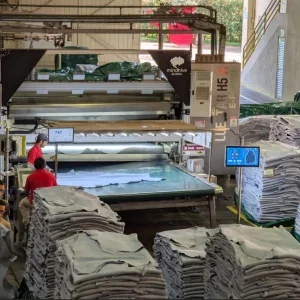JBS Couros has launched a type of upholstery leather produced in a new way that boosts its environmentally responsible nature.
Dubbed “Essntial”, the leather debuted during the recent Interwoven trade show at High Point North Carolina in November. The new type is made with a process that requires up to 70% less water. In addition, Essntial needs as much as 40% fewer chemicals for production. Last but certainly not least, the leather has an aroma that is woody or gives off floral essence.
This latest leather product was developed under the moniker of the company’s Kind Leather. The concept is focused on manufacturing leather that has the same or better quality than what’s already available. Moreover, it is done with less energy, chemicals and water.
An entirely new twist is the inclusion of different aromas in the leather. Both scents used in the leather – woody and floral – were chosen based on market research. Research and development at Conceria Priante, the JBS Couros division based in Italy, conducted market research on 26 different essences that could have been included..
“The name Essntial reflects the meaning of the products to be created using this technology, which is to use only the essential to produce the leather. Moreover, adding a very delicate aroma creates an additional curiosity about the production and has attraction potential in the market,” says JBS Couros President Guilherme Motta. “The innovation was born from the assumption that new generations place greater store on the experience than the properties of material things and, with the aroma aspect, we are seeking to make the consumer’s interaction with the leather one-of-a-kind and memorable,” Motta says.
The Kind Leather concept was introduced in 2019. It uses a more efficient, innovative production process that eliminates the mostly unusable parts of leather right from the start. Rather than go to waste, this material is transferred to other sectors, such as food and pharmaceutical manufacturing. The waste instead becomes raw material for other industries and adds to the value chain of this animal byproduct.






